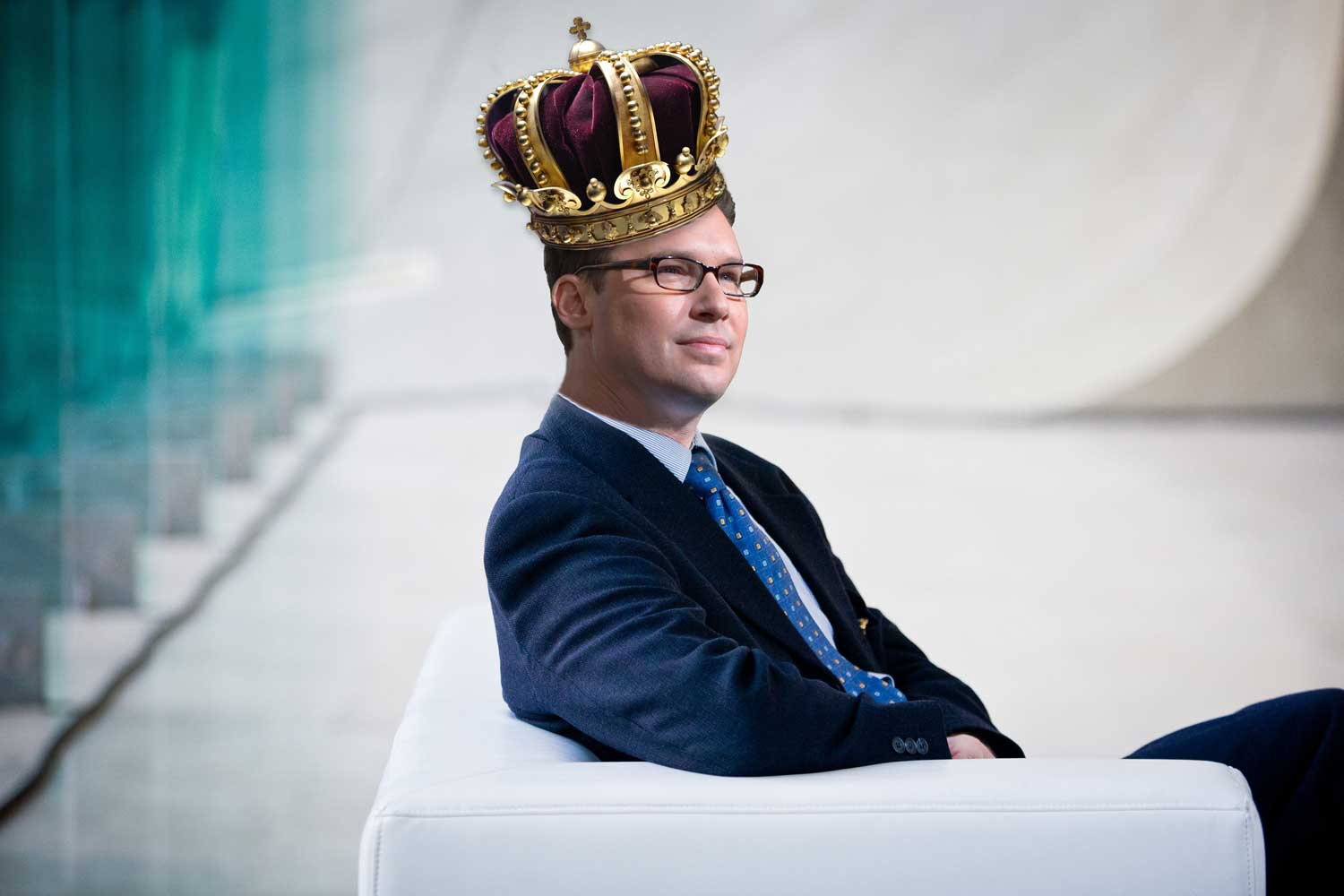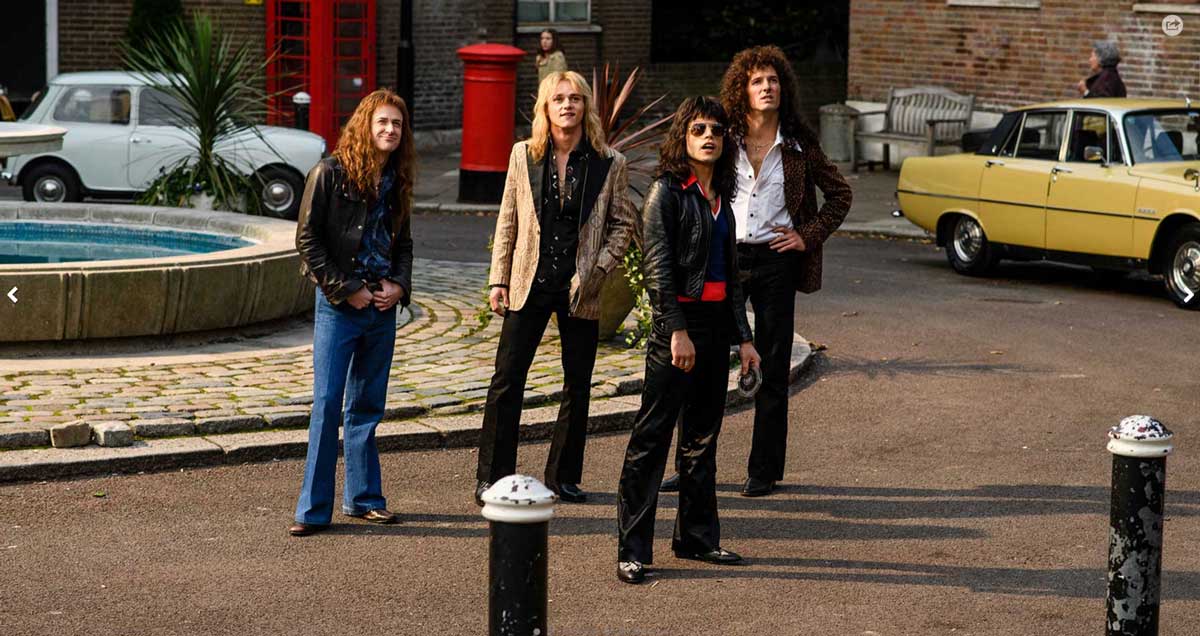
Producer Graham King toiled for eight years to get Bohemian Rhapsody made, but we’re gonna go with the director — in this case Bryan Singer — as the one who gets the crown. (Photo collage: MaxTheTrax)
With Bohemian Rhapsody, the filmmakers live up to the promise Queen made to fans in 1977 with the album News of the Day. The film is a sensation of sight and sound, a thrill of dazzling costumes and locations, all at the service of characters ranging from exotic to icky to emotionally wringing. It’s accessible yet experimental, and epic as any night at the pop opera (on both sides of the curtain!). Grab the popcorn and prepare to be rocked!
With opening moments that include a 30-second Steadicam shot of lead singer Freddie Mercury backstage at Wembley Stadium, expectations are set for a journey both fantastic and mundane. In London, Mercury exits his trailer and heads to the front of the house at Live Aid, the historic 1985 charity show on two continents. The crowd roars while the soundtrack cranks Queen’s “Somebody to Love” (three minutes that sync lyrically and rhythmically to establish a punchy, poignant tone right out of the gate). As Mercury arrives at his date with destiny, the security staff ceremonially part a tall curtain — all that hangs between the singer and 80,000 concert fans. The action cuts before Queen’s Mercurial leading man (played by Rami Malek) crosses that proscenium, but the camera gazes through for a glimpse at the metaphoric Mount Olympus this hero will scale. As openings go, it’s quite immersive. Thus the stage is set for an exhilaratingly strange and ultimately somewhat heartbreaking adventure. With music that had me dancing in my seat.
I confess, until I saw this film I couldn’t say I was a Queen “fan.” I went in knowing only the most obvious things about this band. I was aware they were British, that the lead singer was gay (somewhat extravagantly so, I seem to recall, at a time when “coming out” was virtually unheard of). They had a bunch of hit songs, which I dutifully enjoyed in that abstracted way one does listening to the radio. I had ample opportunity; Queen was a staple of FM when I was growing up in the Philadelphia area. Unlike David Bowie, Eric Clapton, The Who and (most importantly) The Rolling Stones, Queen never graced my record collection. But to know Queen you didn’t have to own them. They were embedded in the zeitgeist (ranking somewhere above Kiss in my estimation; although I liked Queen’s music better, they seemed theatrical to a fault).
Bohemian Rhapsody made my list of must-sees for two reasons: nostalgia for my prime rock ‘n’ roll years (when I attended the Philadelphia portion of Live Aid, the concert that bookends the film), and intrigue as to how actor Malek would conjure Freddie Mercury. The Mr. Robot guy didn’t seem anything like the mustachioed Mercury. Prior to the screening I was not aware that Mercury was of Persian descent (a Parsi, born Farrokh Bulsara), and hadn’t yet discovered Malek is Egyptian. What I did know was that that like Christian Dior’s Poison, Bohemian Rhapsody carried a whiff of the forbidden, an ineffable taint (the perfume smells like cat piss, by the way). It wasn’t until looking up stuff in the middle of writing this review that I reacquainted with the fact that director Bryan Singer was “fired” a few weeks prior to completion of principal photography. Kind of unusual, and in retrospect, given the material (about a band of misfits who challenge the system with some dire consequences), so perfect!

Regency Period: Bohemian Rhapsody principal cast, from left, Joseph Mazzello plays Queen bassist John Deacon, Ben Hardy as drummer Roger Taylor, Rami Malek as singer/pianist Freddie Mercury, and Gwilym Lee as guitarist Brian May. (Photo: Alex Bailey / 20th Century Fox)
Well, as they say, you’ve gotta crack a few eggs to make an omelette. Art is its own end. Twentieth Century Fox has landed itself a rock biopic that will stand up to the ages despite decidedly mixed reviews on release. This review, in Time, is my favorite. Stephanie Zacharek peppers her opinion with remarkable insight, expressed powerfully. Yet, as with pretty much every other media outlet, she and her editors seem intent on landing a couple of punches on Singer. The Time headline — “Rami Malek Rises Above Bohemian Rhapsody’s Messy Excess” — doesn’t even seem to make sense. (Isn’t messy excess rather the point?) But surveying the reviews, this is the popular consensus and what any standard headline aggregator would have spit out.
But this film is funny (getting lots of mileage out of the song “I’m in Love with My Car”), illuminating (as we see some of the experimental ways the band made music, i.e., cascading coins on drum skins) and insightful (exploring art within the context of society’s expectations that things “fit in.” Yes, there are some cliches (even Queens are lonely) but they’re not gratuitous, and the film is so enjoyable they’re barely noticed. Malek as Mercury is impressive, hypnotic, astounding even. On that everyone seems to agree. But brilliant performances don’t happen by accident. I’ guessing there’s a greater likelihood a lousy director will throw some genius actor off his game than the opposite — a dissolute hack catches lightning in a bottle then freerides (though I’m intrigued to research the stats on that!). Fox seems to want to distance itself from Singer. And probably probably some sort of cooling off period is necessary. But having been fired with a reported two weeks left of shooting left, Bryan Singer deserves a lot of credit for this excellent film (the DGA agreed, and he has sole director credit). Still, readers will perhaps understand my belated embarrassment looking back on how, immediately following the film at Variety’s Music for Screens Summit, I gushed amidst the busy NeueHouse valet park — maybe loud enough for even those on the outlying plaza to hear — “Bryan Singer deserves an Academy Award!” (Har-har-har! Pause here to enjoy a laugh at my expense.) The rejoinder, from the gentleman to my right, “Rami Malek, maybe, but not Bryan Singer.” Singer is in the doghouse and is unlikely to garner industry plaudits in a vote held anytime soon. My opinion aside (and I do agree about Malek), history will be the judge.
As with any film, it was a team effort and everyone holds up their end. The editing, in particular, is superb, hurtling the story along with elegance and just the right rhythm. At 134 minutes, Bohemian Rhapsody is a long film that doesn’t seem so, due in large part no doubt to crisp, well-paced scenes. The frames come quickly, a visual assault, then lay back and even linger for some of the emotional moments. I was surprised, though should not have been, to discover afterwards that editor John Ottman, ACE, is a working composer with many scores to his credit. The film is rhythmically gorgeous in every way. There is no underscore on Bohemian Rhapsody; virtually all the music is Queen (punctuated with snippets of opera, and even some legacy pop).
The cinematography by Newton Thomas Sigal (ASC) is extraordinary, including some very cool in-camera effects (note: the press conference scene). Costumes, by Julian Day, are splendiferous, from lavish togs to casual-wear (certainly fun for someone who lived through the era. Malek at one point dons a red version of a sweater I owned in green); it was fun to watch their hairstyles change! Makeup and production design— all of it is right up there with The Crown and The Queen. We’re talking H.R.H. Royal fun! Writer Peter Morgan not only scripted the 2006 film The Queen, he created Netflix’s The Crown. According to producer Graham King, it was Morgan who in 2010 convinced him to take on the project.

Lee, left, tracks a very convincing Brian May, while Malek channels Mick to roll Mercury on a stage dressed to look like Madison Square Garden. At far right is Joseph Mazzello as bassist John Deacon, also known as “Deaky.” (Photo: Alex Bailey / 20th Century Fox)
The casting, by Susie Figgis (whose lengthy film credits start in 1980 and include Ghandi, Velvet Goldmine and Charlie and the Chocolate Factory) is spot on. In Gwilym Lee I felt I was watching documentary footage of the young Brian May. Ben Hardy was also very effective as drummer Roger Taylor, but since I had no sense of who Roger was, or what he looked like, he may as well have been a fictional character to me. Same with Joseph Mazzello as bassist John Deacon. Mike Meyers as record exec Ray Foster is a nice surprise. (He was unrecognizable, perhaps the best compliment one can give an actor). Foster is one of the film’s villains, opposing the band’s plans to release “Bohemian Rhapsody” as A Night at the Opera’s first single because at six minutes it’s “too long for radio.”
One complaint about the film is that many of the characters are out of rock’s paint-by-numbers kit. But they’re stereotypes for a reason (and isn’t opera where villains began the tradition of twirling mustaches?) Another oft-voiced criticism is the film doesn’t portray Mercury as “gay enough.” I’m no expert, but Mercury seems depicted as plenty gay. He kisses men and engages at close quarters, flaunts “boyfriends” in a way that offends his family’s conservative Zoroaster sensibilities. He dresses in all manner of outrageous garb — caftans, capes, crowns, motorcycle gear a la Village People, a glitter leotard, the collar of “an angry lizard.” What were people expecting, Cruising II? Duets with Bette Midler and Barry Manilow? If the public record is to be believed, Mercury did spend his early years in a heterosexual relationship with a woman named Mary Austin (played by Lucy Boynton), with whom he maintained close ties till the end of his too-short life. When Mercury died in 1991, at age 45, due to complications from AIDS, he left Austin the bulk of his estate. Her character gets what seems appropriate screen time (but for some it’s enough to get Singer accused of “straightwashing” the film).
The relationship with Mary underscores Mercury’s complex nature (among bandmates he’s the only one that isn’t a variant on “lovable moppet,” but I didn’t mind. The spotlight was exactly where it belonged). There’s the “straight first half” and “gay second half.” It certainly makes the tale more accessible than had it solely focused on Mercury’s life as a gay man. If there’s enough story, why not appeal to as large an audience as possible? (Opera is in decline. Hooray to Twentieth Century Fox for doing its part.) King’s stated goal, according to the press notes: “The film is a celebration of the music as well as carrying on the legacy of Queen and Freddie and showing a whole new generation who Freddie was.” No preaching to the choir. Since Singer himself at one point seems to have came out as bisexual, it’s hard to understand why anyone would suspect him of downplaying Mercury’s homosexuality purely for commercial reasons. King (Hugo, The Departed, The Aviator), is best known for his long association with Martin Scorsese, and has to his credit many well-regarded biopics (including Argo and Ali, in addition to the aforementioned Aviator and Hugo, a fanciful look at the career of director Georges Méliès). This is not the guy one would expect to sell out Queen.
Indeed, May and Taylor were integral to King getting the rights, and remained involved “throughout the entire creative process,” ensuring “the film remained true to history.” Or at lest a compelling and accurate as one can be in a lifetime-condensed-to-just-over-two-hours version of it. The screenplay is by Anthony McCarten (The Theory of Everything). Does this film have flaws? I’m sure it must. On first viewing, I didn’t notice any. But I’m going to see it again and look for some. I may have to see it again more than once. The music alone makes it worth the repeat path. Even though I’m a boomer of Queen’s generation, showcased as it is in this new context the music seems totally fresh. That says more about the band’s musicianship as it does the quality of the film. And yet… if the film was awful, I wouldn’t have spent the time afterward reading everything I could find about Queen, and logging enough YouTube views see or for that matter, Rami Malek and Bryan Singer).
I’m sure Singer is a flawed human being. And studio execs have fiduciary duties as well as moral obligations. However this awkward situation came to be, in the spirit of Freddie Mercury and opera — in particular Figaro and the tradition of “a single day of madness” — all bad feelings should be put aside and those harboring ill will should kiss and make up. At the end of day, they’ve created a fine film that will be enjoyed by many (and possibly recognized by the few). Now, more than ever, the world needs misfits with a song in their heart.

From left: Mazzello, Hardy, Malek and Lee vibe the band in the studio. (Photo: Alex Bailey / 20th Century Fox)
One Response to "‘Bohemian Rhapsody’: A King, a Queen and a Crown for Bryan Singer"
Comments are closed.


Pingback: ‘Bohemian Rhapsody’ Rules BO in Great Weekend for Music | MaxTheTrax